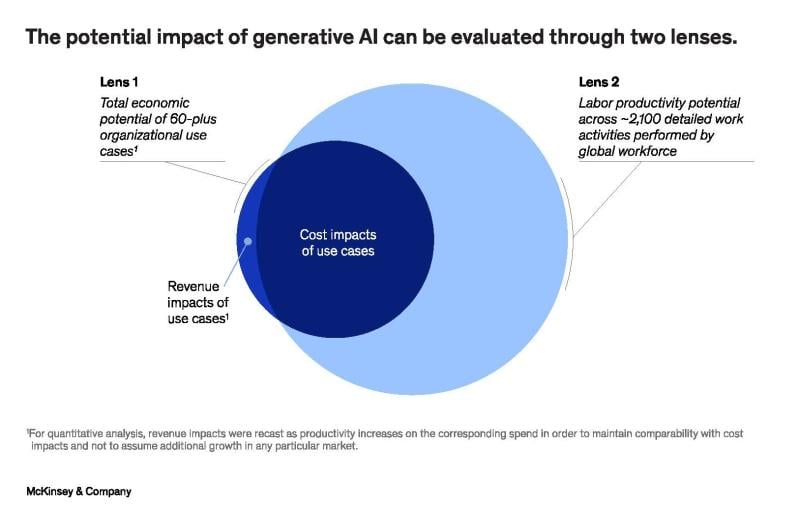-
New survey from Immuta shows that despite companies forging ahead with AI, only half of 700 respondents feel their organization’s data security strategy is keeping up with AI’s tempo
-
In a survey by Nutanix, with a similarly-sized survey base, 91% indicated a need for IT improvement to support AI adoption
-
McKinsey estimated generative AI could add between $2.6 and $4.4 trillion to the global economy annually
AI adoption is irrefutably on the move, as every organization tries to stay artificially intelligent and relevant. So much so that — according to Ed Watal, founder of IT strategy consultancy firm Intellibus — enterprise FOMO is prematurely hastening some AI investments. And new research reveals security issues may slow some organizations into a more safety-first approach in 2024.
Of course, there’s no disputing AI’s economic value. McKinsey estimated generative AI could add between $2.6 and $4.4 trillion annually, increasing the overall $11 trillion to $17.7 trillion economic value of AI (nongenerative) by 15% to 40%. As a value comparison, the firm noted that the entire GDP of the UK in 2021 was $3.1 trillion.

But the buzz around AI’s dollar sign is also met with an equal degree of concern from various corners of the IT industry and the public. From its looming threat on jobs, its power demands on data centers and its needed data security guardrails, the numerous issues prompt the question: are enterprises being too hasty with AI adoption?
“There is a lot of, I would say, wasted energy behind AI right now because people aren't taking the time to think about, ‘Okay, do I have things foundationally set up?’” Watal told Silverlinings.
Since large language models' (LLMs') popularity rocketed with the public release of ChatGPT late last year, he said board members have placed extra pressure on CFOs to “put AI everywhere.” But major security issues still exist surrounding source data, training data and real-time user data security when LLMs are used by an enterprise.
This lack of intentional integration focus is paired with the fact that organizations are struggling to manage scaling business with the pace of AI adoption safely, according to data security company Immuta’s latest report.
Immuta released its State of Data Security Report today surveying 700 data platform and security practitioners at cloud-based companies across the U.S., UK, Canada and Australia. The results revealed that despite companies forging ahead with AI (88%), only half of the respondents feel their organization’s data security strategy is keeping up with AI’s tempo.
Moreover, 44% percent of respondents say gaining access to a new data set takes a week or more, and 56% say these current processes are slowing down access to data.
IT improvement vs. AI adoption?
The findings further convey a lack of industry AI-readiness found in other research from Nutanix — where, from its similarly-sized survey base (650 IT decision makers), 91% indicated a need for IT improvement to support AI adoption.
These problems raise the possibility that infrastructural investments in security and data governance may take precedence in 2024 following this year’s AI craze. Eighty percent of Immuta’s respondents indicated data security-related initiatives will be taking top priority in the next 12 months as opposed to only 20% who said AI integration into business processes will be the primary focus.
In an interview with Silverlinings, Immuta VP Matt DiAntonio reasoned for many organizations, the “initial panic” and pressure to keep up with AI is now followed by the realization that “having strong, deliberate data security practices is going to be the only means of surviving in this world.”
From his perspective on the report, those improvements in the next year will chiefly rely on a central control plane for better visibility into data access and movement within an organization.
Will safety concerns trump enterprise FOMO?
It’s worth noting that other findings suggest whether safety is really taking precedence over innovation remains in a cloudy fog — and a multi-cloud fog at that.
A webinar poll from analytics company TONIC and AI-enabled team formation platform A.Team found that when it comes to AI development, 53% consider safety a priority over innovation while a contending 47% felt innovation should take precedence.
Both Watal and DiAntonio feel the latter (almost) half of respondents reflect the industry’s ever-increasing need for speed in creating strategic value, but there are repercussions for those who lean too deeply into that priority.
“There's going to be a reckoning that happens in the market where people are like, ‘Oh crap, this network thing, this traditional security, it's not good enough for this new analytical, heavy data world,’” DiAntonio concluded.
Watal similarly warned of a lack of fundamental understanding of where and how AI should be implemented. “People aren't taking the time to think, ‘Okay, do I have things foundationally set up? Do I have the safety and soundness? Do I have the ethics questions sorted out? Because they don’t want to slow down and lose the race. So a lot of fear of missing out is driving that.”
Want to discuss AI workloads, automation and data center physical infrastructure challenges with us? Meet us in Sonoma, Calif., from Dec. 6-7 for our Cloud Executive Summit. Use code LIZ500 and save $500 off your pass.